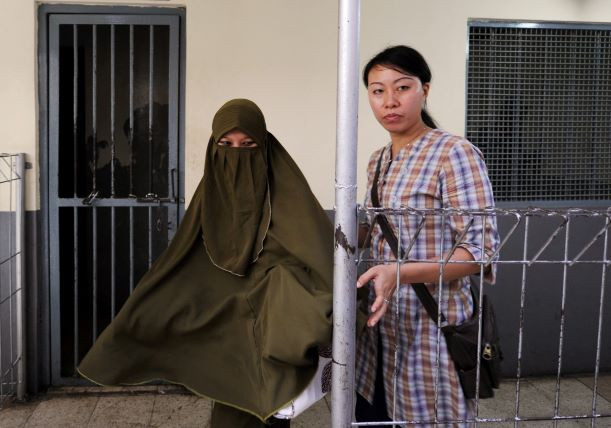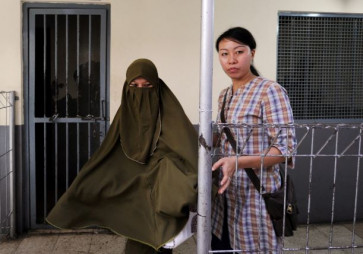Popular Reads
Top Results
Can't find what you're looking for?
View all search resultsPopular Reads
Top Results
Can't find what you're looking for?
View all search resultsGender and a shift in the narrative of violence
The narrative of “maidens with beautiful eyes” envisioned by men must be seen as equivalent to the narrative that offers “entering heaven as a family” as desired by women.
Change text size
Gift Premium Articles
to Anyone
 Under cover: Terrorist Putri Munawaroh (left) is guarded by a plainclothed policewoman as she enters a court room in Jakarta on July 29, 2010. Munawaroh was sentenced to three years in jail for sheltering and assisting terrorists involved in suicide bomb attacks on two Jakarta hotels the previous year. (AFP/Adek Berry)
Under cover: Terrorist Putri Munawaroh (left) is guarded by a plainclothed policewoman as she enters a court room in Jakarta on July 29, 2010. Munawaroh was sentenced to three years in jail for sheltering and assisting terrorists involved in suicide bomb attacks on two Jakarta hotels the previous year. (AFP/Adek Berry)
T
urkish Vice President Fuat Oktay announced on Monday, as reported by CNN, that a recent bombing in the center of Istanbul was committed by a woman terrorist. The attack claimed at least six lives and injured 81.
The blast came as a shock as it took place on Istiklal Street in Beyoglu Square in the heart of Istanbul, a popular tourist destination that should have been under tight security surveillance.
Even before the attack, women’s involvement in acts of terrorism had been rising from year to year. Bloom (2007) notes that with a few exceptions, women are most often just supporters of acts of terror.
There is some truth to this assumption, since among the extremist movement there is a view that, theologically, there is an allocation of gender roles in jihad qital (in the field of battle, with a risk of death), which is the obligation of men, while women are seen as unsuited to this type of action.
There is a conventional narrative that women are not allowed to engage in jihad qital. This view is not due to a high level of respect for women such that they deserve to be protected but rather an assumption that women are a “disruption” to men’s jihad. The aurat of women is considered disturbing to the faith of men in the field of battle. Women are also seen as emotional creatures, unfit to carry out violent acts.
But in fact, in the latest research, as quoted by Rachel Rinaldo from Thomas (2021), women were involved in 214 suicide bombings worldwide from 1985 to 2015. This figure accounts for around 10 percent of the total suicide attacks, with varying backgrounds based on religion, culture, belief and local political problems. The study calculates that the largest number of such acts committed by women were motivated by religious ideology, especially Islam.
So why is it so hard to accept and acknowledge this fact? It seems that the difficulty in reading women’s involvement in acts of violence arises from an inability to use an analysis that links acts of violence with women’s agency. This difficulty arises from a gender-biased view that women (who have wombs) could not possibly have the courage to commit radical acts of violence, because in terms of their gender women are considered cowardly, soft/feminine and caring.


















